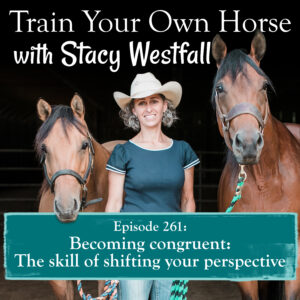Episode 261: Becoming congruent: The skill of shifting your perspective
November 15, 2023/

In this episode, we discuss the transformation that is possible when you learn the skills to support change.
Three students join me and share their challenges, and life lessons learned through horses.
As you listen, pay close attention to the choices these students have made and how being part of a community supported this change.
Topics discussed include:
- The wordless connection with horses
- Money
- Learning at your own pace
- The approach we learn with ourselves, and then use with our horses (and others in life)
- Becoming congruent
- Look for the good first
- Celebrating together
I hope that by sharing their stories, you’ll hear that what they’ve achieved and realize it is possible for you too.
SUBSCRIBE TO THE PODCAST HERE:





YOURS FREE
WHY IS MY HORSE...?

